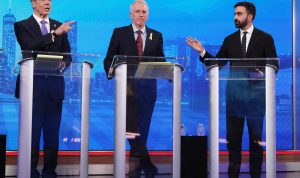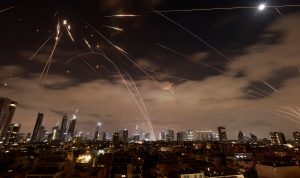This week, Russia launched one of its largest sustained attacks against Ukraine since Vladimir Putin ordered an invasion of the country in 2022. The offensive, consisting largely of missiles and drones, came as President Donald Trump threatened to wash his hands of the conflict. Recently, Trump has expressed annoyance with Putin’s unwillingness to make a deal to end the war, accusing the Russian President of “playing with fire.” But Trump continues to resist increasing sanctions on Russia, or sending new military aid to Ukraine. European leaders, who are more supportive of Ukraine, have pushed for a ceasefire, but Russia has refused to agree to even a thirty-day pause. With Putin’s military making progress on the battlefield and American aid drying up, the Russian leader may see no advantage in backing down.
If Russia and Ukraine do eventually return to negotiations, what might they look like? To talk about that question, I recently spoke by phone with Sergey Radchenko, a professor at Johns Hopkins School of Advanced International Studies, and the author of “To Run the World: The Kremlin’s Cold War Bid for Global Power.” Radchenko, writing with Samuel Charap, has published acoupleofarticlesinForeign Affairsover the past fourteen months about why peace talks have failed before, and how they might succeed in the future. During our conversation, which has been edited for length and clarity, we discussed why Trump’s desire to get a deal immediately may be pushing Putin away from a settlement, whether the earlier talks between Russia and Ukraine really had a chance to succeed, and what the past several months reveal about Putin’s willingness to ultimately compromise.
Trump has been in office now for more than four months. What has his return told us about the war in Ukraine and the actors involved?
I don’t think we have learned all that much about the war. But we have learned something about what Trump wants to accomplish, and we have perhaps learned why he’s not going to be able to accomplish it. Trump rolled into office with the expectation that he would be able to put an end to this war in no time. I think he ignored the complexity of the conflict. The people he appointed to run his Ukraine portfolio—people, in particular, like Steve Witkoff, who has been charged with negotiating with the Russians—don’t seem to have the necessary experience to understand the underlying issues, which is why I think Trump was ultimately surprised. He did not expect the negotiations to be so difficult. Also, Trump is very impatient, and Putin is playing a long game. This is the main reason why negotiations have become so protracted. What I find surprising is that Trump ever thought that it would be different.
I was maybe naïve too, because my thinking when Trump came into office was that this actually would be a good time for negotiations. Not negotiations that would be good for Ukraine, but negotiations. You had Trump make clear that American support was drying up, and you had Trump incredibly anxious for a deal with Putin. I thought,Oh, Putin’s going to get the deal that he wants.So it has surprised me that Putin has seemed so resistant. What was I missing?
Putin is interested in a better relationship with the United States, but not at any price. He wants Trump to help him get there by arm-twisting Volodymyr Zelensky to agree to conditions that Zelensky would never otherwise agree to. Trump is really in a negotiating mode. He clearly doesn’t like Zelensky for a variety of reasons, but he doesn’t want to be put in a situation where public opinion will say, “Trump is basically just doing Putin’s bidding and he’s just selling out Ukraine and he’s not getting anything in return.”
So Putin expected that he could perhaps get more from Trump. I don’t know how much he expected on that front, but the bottom line is that he has his goals that he wants to achieve in Ukraine, which relate to Ukraine’s non-aligned status and demilitarization. He also wants control of the territories that he has annexed but does not yet totally control, as well as protection for Russian speakers and for the Russian Orthodox Church in Ukraine. But Putin can still hold out for a considerable length of time to see if he can bargain for better conditions.
And the reason you think Putin can hold out is that the war is going better for him?
For two reasons: First, when you’re negotiating with someone who’s desperate to make a deal, you feel like you would effectively stand to get better conditions by waiting. Imagine if you’re in a situation of selling a house and you’re dealing with a buyer who’s absolutely desperate to buy and will go out of his way to give you the best conditions. You could try to extract even more by holding out. Now, there’s of course a possible downside to the strategy, which is that Trump has repeatedly said he might walk away or impose new sanctions. But Putin feels that perhaps the sanctions that could be imposed would not be particularly dangerous.
Or perhaps they won’t get imposed at all.
Or perhaps they won’t get imposed at all. There’s also no clarity about what Trump means by “walking away.” It’s been very interesting to watch the Kremlin’s reaction to Trump’s threats, saying he’s becoming too emotional or he’s not getting enough information, or he should be more patient, and so on—the way that you would perhaps talk about a child or someone deeply incompetent. And maybe they are right, frankly.
And then the other aspect that you’ve alluded to is that Putin feels that he has the wind at his back militarily. This war has not progressed very far in three years, but the Russians have been making some progress in recent months. And so the longer you wait the better your chances, because you’ll get more territory before a ceasefire.
Let’s turn to previous negotiations in Istanbul, in 2022, because one of your pieces wascalled“The Talks That Could Have Ended the War in Ukraine.” But, reading it, I wasn’t sure that you really thought that, or that the reader should think it. What were the talks and how close were they to succeeding?
The title is never chosen by authors. If you read the actual article, it was more about trying to understand the talks. The two sides were trying to agree on a number of issues relating to Ukraine’s permanent neutrality. So one of the things that we did in the article was to try to understand what were the main issues of disagreement. And what was very clear was that there was a discussion about security guarantees that would be given to Ukraine, but they never agreed on the mechanism for offering guarantees, because the Russians tried to introduce an ability to veto them. That was an interesting element, because if you want to actually get a real agreement, presumably you will not want to introduce a clause—which is what the Russians did at the last moment—about trying to kill the whole process for Ukraine acquiring its security guarantees. So that was one thing, but it does not mean that this was a negotiating position that could not be changed later. We don’t know whether it was something that the Russians would insist on.
You make clear in the piece that this negotiation wasn’t all that close to succeeding. You write, “The two sides skipped over essential matters of conflict management and mitigation (the creation of humanitarian corridors, a cease-fire, troop withdrawals) and instead tried to craft something like a long-term peace treaty that would resolve security disputes that had been the source of geopolitical tensions for decades. It was an admirably ambitious effort—but it proved too ambitious.”
The issue—and this is where we were criticized by various commentators—was whether the Russians were negotiating in good faith. And it’s not just about the Russians, but also about Zelensky. Was he negotiating in good faith or was he just basically dragging his feet to see if he could actually change the situation on the ground? And we could not answer this question fully. What we could say, by talking to people involved in those talks, is that the delegations themselves seemed like they were negotiating in good faith, but it’s impossible to know what Putin was thinking. And it’s very difficult to know what Zelensky was thinking.
But here’s an interesting thing that came to light after the article was published. There was another draft that was leaked from the Russians, from 2022. They started out with an absolutely crazy capitulation ultimatum that they were trying to impose on Ukraine. And it had no security guarantees. It was basically like a country signing away its very existence. If you compare that to what was actually worked out toward the middle of April, 2022, you’ll see that there was a lot of genuine back and forth, and it seemed like some sort of a framework was arranged. So that shows that there was negotiation, and that concessions were being made by both sides.
But we argue in the article that negotiations ultimately failed because President Zelensky understood that he could potentially win this war on the battlefield. And, given that fact, he did not want to sign on to what could be a humiliating treaty for him. The Russians had been beaten back at Kyiv, right? They were struggling, And so, under those circumstances, it seemed like you could actually try to win the war.
In your follow-up piece this year, you say that the 2022 negotiations “serve as a reminder that Putin and Zelensky are capable of entertaining significant concessions. Both men have gained a reputation for maximalism in the past three years. But Istanbul showed that they could be open to the kind of politically risky compromises necessary for peace.” I guess it comes down to the meaning of the word “entertaining,” but I wasn’t sure that we actually do know this.
The question is: Are they dogmatically determined to not change their positions at all, or are they willing to change their positions and potentially agree to something? And the argument that we make is that, in the process of negotiating, both sides were willing to make concessions. Zelensky felt that he could actually win the war, but let’s say the situation unfolded in a different way. Perhaps he would have felt that the talks should continue and they would have reached an agreement. Would that be a great agreement for Ukraine? Probably not.
Obviously the status quo is not great either.
The status quo is not great either. But the question is really: Is Zelensky ultimately willing to make concessions? In his steps since Istanbul, you can see that he has been willing to entertain certain ideas. For example, the notion that Ukraine will not try to reclaim the territories that are internationally recognized as Ukrainian from 1991. He has basically acknowledged that Ukraine will not do that, but he has been insisting on security guarantees. And that’s why, in our second piece, we raised that as a major obstacle. Ukraine needs real security guarantees.
One of the interesting points you make in that follow-up piece is this:“The lack of Western willingness to provide Ukraine security guarantees has been a major challenge to reaching a settlement; it remains an impediment.”What I thought you were saying here is that, even if we can blame the war on Putin, the West has not decided what it wants to offer Ukraine. And obviously, with Trump in office, this situation becomes even more difficult.
It has been a long-standing problem. Let’s start with the American policy toward Ukraine, going back to 2008, and the promise to have Ukraine inNATOwithout providing any real, viable path toward that. That, to me, seemed like a really bad policy that leaves Ukraine in the lurch. Something has been done, but not enough to make Ukraine secure. Now, fast-forward to the time of Istanbul. The Ukrainians are negotiating in Istanbul with the Russians. They’ve negotiated security guarantees that involve Western interests—the West would have to come to Ukraine’s aid if Ukraine is reinvaded. This is then presented to Western powers and they’re saying, “Wait a second, we are not going to sign anything like that.” The problem was that the security guarantee in the draft treaty was even stronger than the language of the collective-security provision ofNATO. And so if you are an American policymaker, if you’re a British policymaker, are you able then to say, yes, “We’re going to commit to go to war with a nuclear power if Ukraine is reinvaded? The answer is no. It was not on the agenda. The only thing that the Biden Administration could do was to continue providing weapons. And do that very carefully.
And so then we fast-forward to where we are today. Again, the Americans are clearly not willing to come to Ukraine’s rescue in case of Russian reinvasion. That’s just clear. Are the Europeans willing to do that? And here we’ve had uncertain noises. Witkoff criticized this, and he’s right, because you ultimately do not have a commitment to come to Ukraine’s defense from Europe. You have some sort of uncertain promise that there will be troops that might be sent. But for peace to be achieved you have to provide security guarantees.
One of the things that the former Israeli Prime Minister Naftali Bennett asked Zelensky during one of their meetings, back in 2022, was: Why do you want those security guarantees? Do you think the Americans will actually come to your rescue? You have to use the Israeli model. But, of course, the thing that Naftali Bennett omitted from his discussion with Zelensky was, first of all, Israel is not surrounded by enemies that are as powerful as Russia. And, second, Israel has nuclear weapons. So Ukraine finds itself in an absolutely impossible predicament.
Just to bring the story up to the present day, I saw youtweetrecently that Trump saying that Putin is “playing with fire” while not actually providing Ukraine aid is “painfully bad diplomacy.”
It’s painfully bad because it’s so different from the well-known method, which is to tread softly and carry a big stick, right? Trump shouts very loudly, and there is no real stick there. The stick that has been discussed is economic sanctions, but this threat doesn’t seem credible.Where the United States could make a difference is that it could actually provide weapons to Ukraine. Is Trump willing to go that way? He’s not even talking about that. If he actually did it, he would get much better results with Putin. The way you negotiate with an adversary like Putin is, basically, you indicate that you have a greater commitment to defend Ukraine than Putin has to carry on with this war. And because you have greater economic resources, military resources, by making this commitment, you will prevail in negotiations, because Putin will understand that time is not on his side.
In the piece on the 2022 negotiations, you write, “And then there is the Russian side of the story, which is difficult to assess. Was the whole negotiation a well-orchestrated charade, or was Moscow seriously interested in a settlement?” It does seem like the simplest explanation remains that Putin just doesn’t want a deal. We know that wars can become hard for aggressor states, as America was in Vietnam, to wind down, too. TheWall Street Journalhad apiecethis week about how the Russian economy has completely switched to a war footing, and it would actually be very difficult to switch it back to a peacetime footing. So these things take on a life of their own.
Well, if we accept that Putin does not want peace, then we have to accept that Putin just wants perpetual war. Is that what he wants? Or does he actually want to bring this to some kind of a reasonable conclusion? The question for me isn’t whether Putin does not want a deal but what kind of deal does he want? At the moment, he feels that he can get a better deal than the one that is on offer. And the challenge is to change his calculus and to make him think that the deal that he can get now is actually better than the one that he could potentially get in the future. I don’t think Putin is a mindless expansionist. I think there is a method to his madness, and there’s a certain limit to his ambitions. But, at the moment, he feels that the wind is in his sails. ♦









